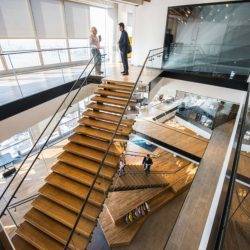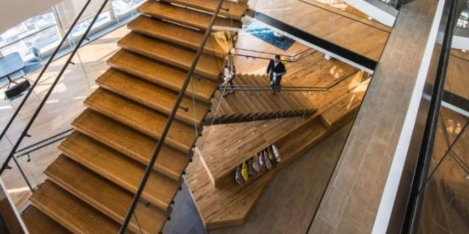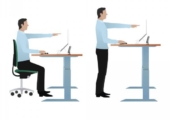January 30, 2017
The Boston Consulting Group: pushing the art and science of workplace design 0
 This month, The Boston Consulting Group (BCG) opened its doors to its latest office in what’s been described as the new heart of New York; namely, the up-and-coming Hudson Yards development. Thought leaders from the world of workplace design including a representative from including Workplace Insight were invited to the launch of the new workspace to find out how the world’s leading advisor on business strategy has pushed the art and science of workplace design. BCG, which is consistently ranked near the top of Fortune’s annual Best Companies to Work For survey, worked with an array of experts for input into the design and use of innovative technologies, including Gensler, Humanyze and Unwork. Leesman was brought in to offer a neutral voice when the project was already in motion to validate the design proposal.
This month, The Boston Consulting Group (BCG) opened its doors to its latest office in what’s been described as the new heart of New York; namely, the up-and-coming Hudson Yards development. Thought leaders from the world of workplace design including a representative from including Workplace Insight were invited to the launch of the new workspace to find out how the world’s leading advisor on business strategy has pushed the art and science of workplace design. BCG, which is consistently ranked near the top of Fortune’s annual Best Companies to Work For survey, worked with an array of experts for input into the design and use of innovative technologies, including Gensler, Humanyze and Unwork. Leesman was brought in to offer a neutral voice when the project was already in motion to validate the design proposal.









 Amos Tversky and Daniel Kahneman introduced the concept of Loss Aversion in 1984, highlighting people’s tendency to strongly prefer avoiding losses to acquiring gains. Most studies suggest that losses are twice as powerful, psychologically, as gains. Lose £100 and we will feel a remorse that easily outweighs winning £100. In a similar fashion we find it very hard to see future positives when confronted with short term loses. We understand easily what we have lost but cannot imagine what there is to be gained. Furthermore, as Frederic Bastiat wrote in an 1850 paper, “That Which is Seen, and That Which is Not Seen”, man has a tendency to “pursue a small present good, which will be followed by a great evil to come, rather than a great good to come, at the risk of a small present evil”. Put these together and it is no wonder that, by and large, the future of work, corporate real estate and the workplace is so widely misunderstood.
Amos Tversky and Daniel Kahneman introduced the concept of Loss Aversion in 1984, highlighting people’s tendency to strongly prefer avoiding losses to acquiring gains. Most studies suggest that losses are twice as powerful, psychologically, as gains. Lose £100 and we will feel a remorse that easily outweighs winning £100. In a similar fashion we find it very hard to see future positives when confronted with short term loses. We understand easily what we have lost but cannot imagine what there is to be gained. Furthermore, as Frederic Bastiat wrote in an 1850 paper, “That Which is Seen, and That Which is Not Seen”, man has a tendency to “pursue a small present good, which will be followed by a great evil to come, rather than a great good to come, at the risk of a small present evil”. Put these together and it is no wonder that, by and large, the future of work, corporate real estate and the workplace is so widely misunderstood.
























December 23, 2016
Presenteeism doesn’t aid productivity, so employers should set workers free 0
by Mark Eltringham • Comment, Flexible working
More →